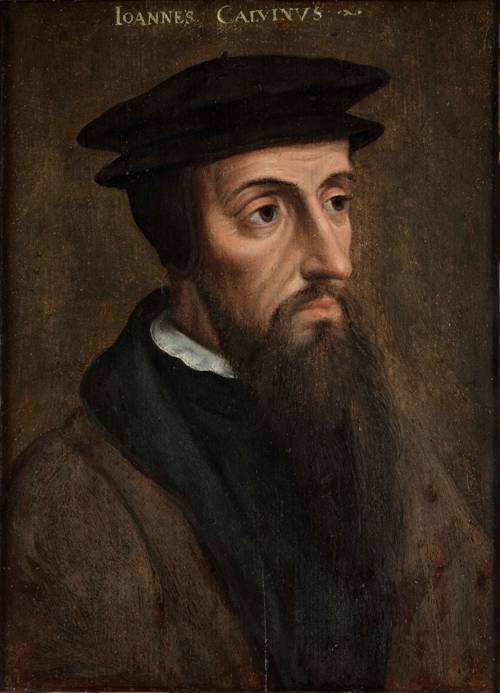
FAQ About John Calvin

Who was John Calvin?
John Calvin was a French theologian, pastor, and reformer during the Protestant Reformation. He was a principal figure in the development of the Christian theology later called Calvinism, which includes doctrines of predestination and the absolute sovereignty of God in salvation. Calvin's thoughts and teachings significantly influenced Christianity, especially through his seminal work, Institutes of the Christian Religion.

What are the main principles of Calvinism?
Calvinism is based on several theological principles outlined by John Calvin. The main elements include the doctrine of predestination, the belief in the sovereignty of God, and the concept of total depravity. These principles are often summarized by the acronym TULIP, which stands for Total depravity, Unconditional election, Limited atonement, Irresistible grace, and Perseverance of the saints.

How did John Calvin contribute to the Protestant Reformation?
John Calvin contributed to the Protestant Reformation by providing a systematic theology that emphasized the sovereignty of God and the authority of the Bible. His works, particularly the Institutes of the Christian Religion, laid the foundations for Protestant beliefs and practices and influenced a wide range of reform movements in Europe, including in Geneva, where he established a model reformed church government and promoted education.

When and where was John Calvin born?
John Calvin was born on July 10, 1509, in Noyon, a small town in the Picardy region of France. His birth occurred during a period of significant religious and political upheaval in Europe, which greatly influenced his later works as a reformer.

What is John Calvin's most famous work?
John Calvin's most famous work is the Institutes of the Christian Religion. First published in 1536, it is one of the most influential theological works of the Reformation period. The book serves as a comprehensive manual for understanding Protestant theology and was continually revised and expanded by Calvin throughout his life.

What was the impact of Calvin's teachings on Christianity?
Calvin's teachings had a profound impact on Christianity, especially in shaping Protestant doctrine and church practices. His ideas about predestination, church governance, and the role of scripture in church life influenced various Protestant denominations, leading to the establishment of Calvinism. This theological framework spread across Europe and America, significantly shaping the religious, cultural, and political landscapes of these regions.

How does Calvinism interpret the concept of predestination?
In Calvinism, predestination is the doctrine that God has foreordained all events, especially that God has elected certain souls to eternal salvation. This concept underscores the sovereignty of God in the salvation of souls, affirming that human beings cannot achieve salvation through their actions, but are instead chosen by God before the foundation of the world.

What were some criticisms of Calvin's ideas?
Criticisms of Calvin's ideas often center on his doctrine of predestination, which some view as making God seem arbitrary and undermining human free will. Others have critiqued the perceived rigidity and austerity of Calvinist worship and church governance. Despite these criticisms, Calvin's theological contributions have been influential and enduring.

Where did John Calvin implement his reform ideas?
John Calvin implemented his reform ideas primarily in Geneva, Switzerland. There, he established a theocratic government and worked on church governance, emphasizing the importance of moral discipline and social order according to religious principles. His reforms in Geneva served as a model for other Protestant movements.

Did John Calvin have any significant contemporaries?
Yes, John Calvin had several significant contemporaries. Martin Luther, Huldrych Zwingli, and Philipp Melanchthon were other leading figures of the Protestant Reformation. Each contributed to the reformation movement in different ways, although Calvin's theological approach was distinct in its emphasis on predestination and church organization.

What influence did Calvin have on future political thought?
Calvin's ideas significantly influenced future political thought, particularly with his promotion of the concept of church governance and communal responsibility. His emphasis on the role of a disciplined, moral society impacted the development of Western political and social structures, contributing to ideas that underpin modern democracy and the value of individual moral responsibility.

How did John Calvin's teachings spread beyond Europe?
Calvin's teachings spread beyond Europe largely through the work of missionaries and the migratory patterns of European settlers, particularly to regions in North America. The Puritans who settled in the American colonies were heavily influenced by Calvinist ideas, and his theological concepts helped shape the early religious landscape of the United States, contributing to its cultural and religious diversity.

What role did education play in Calvin's reform movement?
Education was a central element in Calvin's reform movement. He believed that a literate populace was critical for understanding the Bible and participating in a reformed church community. This belief led to the establishment of institutions like the Academy of Geneva, which promoted rigorous education in theology and humanities, influencing future generations of theologians and leaders.

What was the Academy of Geneva?
The Academy of Geneva, founded by John Calvin in 1559, was an institution dedicated to the education of ministers and theologians. This academy became an important center for Protestant scholarship and helped spread Calvinist theology throughout Europe and beyond. It played a crucial role in disseminating Reformed theology and training future Protestant leaders.

Why is Geneva significant in the history of Calvinism?
Geneva is significant in the history of Calvinism because it was the city where John Calvin established his theological and ecclesiastical reforms. Known as the "Protestant Rome," Geneva became a hub for Reformed theology, attracting scholars and religious leaders. Calvin's successful implementation of a model reformed city in Geneva greatly influenced the spread of Calvinist ideas across Europe and beyond.

How did John Calvin's work differ from Martin Luther's?
While both John Calvin and Martin Luther were central figures in the Protestant Reformation, their theological emphases differed. Luther focused on justification by faith and criticized many practices of the Catholic Church, while Calvin developed a more comprehensive system of Christian doctrine that emphasized predestination and the sovereignty of God. Calvin also placed greater emphasis on church governance and discipline.

What is the significance of the "TULIP" acronym in Calvinism?
The "TULIP" acronym is significant in Calvinism as it summarizes the core tenets of Calvinist theology: Total depravity, Unconditional election, Limited atonement, Irresistible grace, and Perseverance of the saints. These principles outline Calvin's concepts of salvation and divine grace and are essential to understanding Reformed theology.

What were Calvin's views on church governance?
Calvin's views on church governance were centered around the idea of a theocratic system where church leaders also wielded significant social influence. He emphasized the need for discipline and moral righteousness within the church community, advocating for a church structure that included pastors, elders, and deacons to guide and govern congregation life according to biblical principles.

How did Calvinism affect economic practices and ideas?
Calvinism had a profound effect on economic practices and ideas, often associated with the "Protestant work ethic," which Max Weber famously linked to the rise of capitalism. Calvin's emphasis on hard work, discipline, and frugality encouraged economic development and laid the foundation for the values of modern capitalism. His teachings promoted a societal structure where productivity and responsibility were seen as spiritual virtues.

Did John Calvin ever face opposition for his teachings?
Yes, John Calvin faced opposition for his teachings from both religious and secular authorities. His strict and often uncompromising reforms sometimes led to conflicts with city councils and other reformers who disagreed with his ideas. Additionally, his views on predestination and church discipline were contentious and led to debates with other Protestant leaders and sects.
